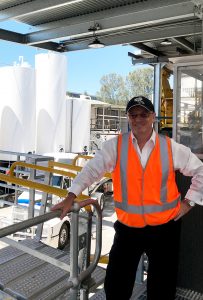“Revenue is vanity; profit is sanity; cash is reality” – an interview with Simon Ashley, CFO.
Valuable lessons for SME leaders: an interview with experienced CFO Simon Ashley
Simon Ashley is a Chartered Accountant who started out as an auditor at Big 4 firms KPMG and PwC, before moving into industry. He has since held various senior management, executive and board roles both in Sydney and abroad, and has broad experience gained in a diverse range of industries including Private Health Care, Leisure, Manufacturing and Gaming.
Simon is now a Director and part owner (through management buy-out) at Bituminous Products, an Australian company specialising in the manufacture and supply of bitumen-based products for road surfacing and general industrial use. Simon originally joined the MBO team as the CFO, a functional role he still performs, but now also has some broader general management responsibilities.
Being a long-time client and friend, our Partner Mark recently had the opportunity to ask Simon a few questions about being an effective CFO. Simon’s insights come from a wealth of experience across these matters and would be useful to any SME leader exploring strategies for improved governance, management accounting and people management.
Mark: So, Simon, what’s the key to being an effective CFO?
Simon: It’s not always as complicated as people make out, especially with all the technology that is available today and the ability to get the right support when you need it. You can definitely rely on your accountant to meet due dates, other requirements and overview of the business, but the key to being a CFO is using all the information available to you to identify potential financial problems in the business and to effectively solve them. Ideally before they’ve happened. There’s a lot of variety and creativity in this, which always keeps me interested.
We usually have a framework put in place to quantify the outcomes of particular actions and these frameworks enable us to make data-driven decisions on a daily basis. Basically, it’s part of my role in the management team to know which activities are working (and making money) so we can further support those, and which activities are NOT so we can fix or put a stop to them, quickly.
Mark: What are the key things to monitor, if you had to choose three?
Simon: I’d say trading revenue, debtors and banking. Firstly, we monitor the revenue from daily sales and then assess the profit generated from that. This is a great way to see if any improvements are needed, or if things are tracking well to budget.
We’re constantly monitoring our debtors (accounts receivable) but generally our clients, especially Blue Chips, pay on terms. We look at it on a case by case basis and decide if any follow-up is needed to ensure we don’t run into any cash flow shortfalls. We’re always making sure that the paperwork we have submitted is in order, especially when dealing with large companies to ensure that this doesn’t lead to bottlenecks in inbound cashflow.
The third thing is to ensure we are on top of our daily banking. In other words, that what we are expecting to happen re the first two is actually happening when it is supposed to.
Mark: Do you prepare budgets and if so, can you talk us through the process?
Simon: Yes absolutely, it’s a fundamental discipline. Also, it is something the bank requires.
We start the process 2 months out from the beginning of the financial management year, using the actual previous 10 months results, we also add the budgeted next 2 months numbers. It’s then an inclusive process involving the branches where each branch manager corroborates or approves the budget assumptions.
Part of this process is the capital budget, where each manager makes a pitch for their capital requirements to be assessed by the Board. Once approved these are factored into the budget.
Mark: How do you approach cash flow management?
Simon: We use a 3-way forecast. This includes making assumptions about where our Balance Sheet, Profit & Loss and Cash Flow statement figures should be. Obviously, we want to make sure there is always adequate cash flow, which is why our 3-way forecast is so important. It helps us identify any funding requirements such as peak working capital needs and to phase the timing of capital projects.
A quote from a former mentor comes to mind: “Revenue is vanity; profit is sanity; cash is reality.” That’s one to live by as a CFO.
Mark: Do you find yourself getting lost in numbers and losing sight of other aspects of the business?
Simon: Not really, and hopefully my colleagues would agree with that. In fact, I have found a key part of my roles over the years has been trying to develop the careers of people in the organisations that I’ve been in. Seeing how we can incentivise and remunerate them effectively is one part of it but making sure that those who want development are supported and feel motivated, are being given new opportunities and making sure that they know their contribution is appreciated have all been key parts of my job.
It’s not all about money, sometimes just communicating effectively and being on the same page with your people is what’s missing. So, I try to make sure we take the time to educate employees about what matters to our business and how their roles or given tasks are benefiting the whole. And of course, listening to any feedback or ideas we may receive from them – that is key for all managers.
It’s also important to keep your staff interested and engaged. Know your limitations and if you don’t have the expertise, outsource the function to someone who does.
A piece of advice I was given early on in my career has really stuck with me: “Wherever you go, make sure you get good people working for and with you, as you’re only as good as those around you.”
Mark: Yes, I agree. I think Richard Branson said something similar.
Mark: The company has enjoyed exceptional growth since the management buy out, what are some of the factors you attribute to that success?
Simon: A combination of things I’ve already mentioned. One is continuous monitoring of performance across the business to spot areas of opportunity and further investment. The importance of problem-solving can’t be overstated as any money saved can be reallocated to more worthwhile areas of the business, such as investing in and updating capital equipment. Efficient resource allocation is a big focus of a CFO.
But the other thing really is getting good people in and encouraging them. As I said before, you need to keep people motivated and engaged, this is something I truly believe in. For example, where incentives are part of the deal, don’t cap them, if you do, aren’t you just capping your own potential for success?
Mark: How do you report to the Board?
Simon: Our Board reporting pack includes our budget vs. actual numbers across the financial statements as well as all the assumptions we’ve used on our next forecasts. We also closely monitor our compliance with bank covenants which was especially critical in our early days. They look for any inconsistencies in what was expected versus what actually happened, not just in the financial data but also in terms of business performance and the operating environment.
In terms of benchmarking or comparing our numbers to those of our competitors or industry, we don’t really do it. We definitely do look at our own historical performance and see how we’re tracking over time. Any changes in trends are noted and analysed in case corrective actions are needed. Again – that’s a key part of my role. Spotting and solving potential problems, before they’ve happened as much as possible.
Summary
If we had to distil the key messages from this great interview, they seem simple yet powerful:
- Monitor and solve problems
- Analyse what activities are and are not working, then either try to fix or STOP doing the things that are not.
- Develop people
- Get in good people, and once they’re in, nurture and incentivise them to ensure they stay and continue to contribute.
- Make more money
- If you get 1 and 2 consistently right, then more often than not, success will follow. “Making more money” may sound like a crude single measure of success but when reinvested it actually helps with 1 and 2, so you can do it all again. If we don’t, then aren’t we just being busy fools?
About Bituminous Products
Bituminous Products is an Australian-owned, independently operated company specialising in the manufacture and supply of bitumen based and associated products for road surfacing and general industrial use. The company has grown steadily to present-day operations, which include manufacturing facilities in Sydney, Melbourne, Brisbane, Townsville and Perth.
Thank you, Simon for your time and insights!




